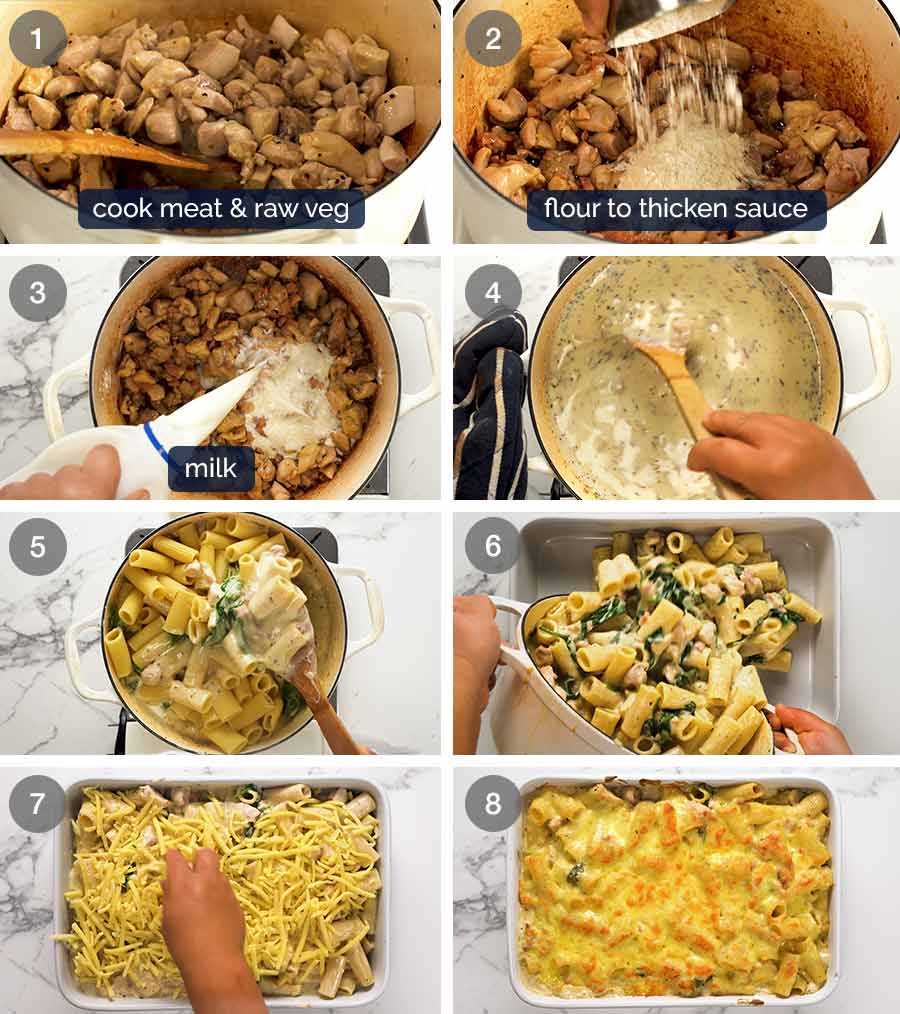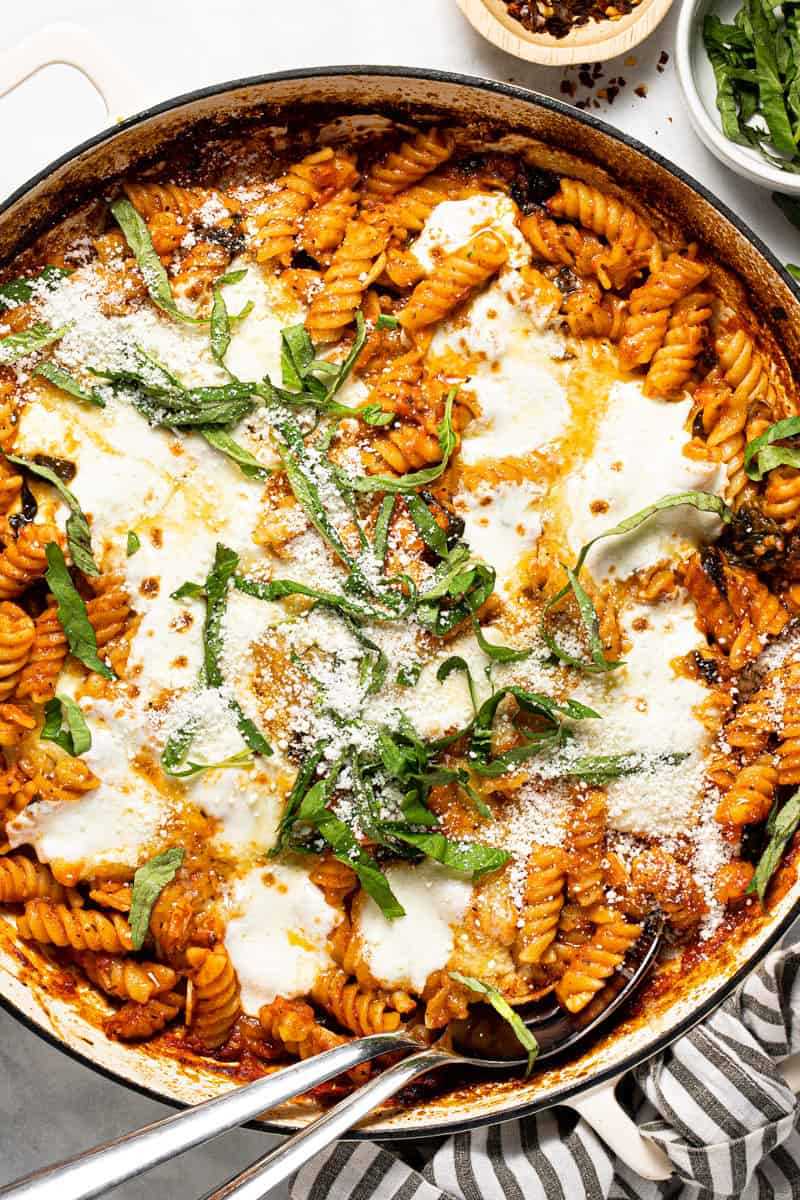When it comes to pasta dishes, there are various cooking methods to choose from. One common question that arises is whether you should cook pasta before baking it. The answer to this question depends on the recipe you are following and the desired outcome of your dish.
For traditional pasta dishes such as spaghetti or macaroni and cheese, it is necessary to cook the pasta before baking. This ensures that the pasta is fully cooked and tender. By cooking the pasta beforehand, you also have the opportunity to drain it and remove excess starch, preventing your dish from becoming too sticky.
However, there are some recipes where you can skip the boiling step and bake the pasta directly. One example is baked pasta dishes such as lasagna or baked ziti. In these recipes, the pasta is layered with other ingredients such as sauces, cheese, and meat, which means it will have enough liquid during the baking process to cook and become tender.
It is important to note that if you choose to bake uncooked pasta, you may need to adjust the amount of liquid in the recipe. The pasta will absorb some of the liquid as it cooks, so you may need to add more sauce or broth to prevent the dish from drying out. Additionally, cooking times may vary, so it’s essential to follow the instructions in your recipe.
Whether you cook the pasta before baking or not, it ultimately depends on the specific dish you are making. Some recipes require pre-cooking to ensure the pasta is fully cooked and tender, while others allow you to bake it directly. No matter which method you choose, with the right ingredients and techniques, you can create a delicious pasta dish that will satisfy your cravings.
Is it necessary to boil pasta before baking?
Many pasta dishes require boiling the pasta before baking it, but it is not always necessary. The decision to boil pasta before baking depends on the specific recipe and the desired outcome.
Reasons to boil pasta before baking
- Most pasta needs to be cooked in boiling water before baking to ensure it is cooked al dente. This helps the pasta maintain its texture and prevent it from becoming mushy.
- Boiling pasta also helps to remove excess starch, which can make the dish too sticky and clumpy.
- In some recipes, boiling the pasta beforehand allows it to absorb flavors from the sauce or other ingredients.
Recipes that don’t require boiling pasta before baking

There are certain pasta dishes that can be baked without boiling the pasta first. These include dishes like lasagna, stuffed shells, and baked ziti, where the pasta is cooked directly in the oven with ample sauce and other ingredients.
However, it is important to note that if you decide not to boil the pasta before baking, you may need to adjust the cooking time and liquid content of the recipe to ensure the pasta cooks properly.
In conclusion, while boiling pasta before baking is a common step in many pasta recipes, it is not always necessary. Consider the specific recipe and desired outcome, and adjust accordingly to achieve the best results.
Advantages of pre-cooking pasta
Pre-cooking pasta before baking can offer a number of advantages that enhance the overall quality and taste of the dish. Here are some of the benefits:
1. Control over the texture: Pre-cooking pasta allows you to control the texture of the final dish. By partially cooking the pasta before baking, you can ensure that it retains its firmness during the baking process.
2. Reduce baking time: Pre-cooking pasta helps to reduce the overall baking time. Since the pasta is partially cooked, it requires less time to finish baking in the oven. This can be particularly helpful when you are short on time or want to prepare a quick and easy meal.
3. Evenly cooked pasta: When pasta is pre-cooked, it ensures that every strand of pasta is evenly cooked. This prevents the pasta from becoming overcooked or undercooked in certain areas, resulting in a more consistent texture throughout the dish.
4. Better absorption of flavors: Pre-cooking pasta allows it to absorb the flavors of the sauce or other ingredients more effectively. When the pasta is partially cooked, it creates small pockets that can hold onto the sauce and other flavors, resulting in a more flavorful dish.
5. Reduced risk of a dry dish: By pre-cooking the pasta, you can help prevent the dish from becoming dry or overly absorbent. This is especially important when baking pasta dishes with a lot of sauce or cheese, as pre-cooking helps the pasta to maintain its texture and moisture.
Overall, pre-cooking pasta offers several advantages that contribute to a delicious and well-executed baked pasta dish. It allows for better control over the texture, reduces baking time, ensures even cooking, enhances flavor absorption, and reduces the risk of a dry dish. So, the next time you bake a pasta dish, consider pre-cooking the pasta for an elevated culinary experience.
Common myths about baking uncooked pasta
Myth 1: Pasta must be cooked before baking
Many people believe that pasta must be boiled or cooked before baking it in the oven. However, this is not always the case. Some recipes, such as baked ziti or lasagna, actually call for uncooked pasta to be layered with sauce and other ingredients before baking. The pasta cooks as it absorbs liquid from the sauce and becomes tender during the baking process.
Myth 2: Baking uncooked pasta will result in a crunchy and undercooked dish
Contrary to popular belief, baking uncooked pasta can actually result in a perfectly cooked and tender dish. When pasta is baked in a sauce, it absorbs moisture and heat from the oven, allowing it to soften and become al dente. The key to achieving the desired texture is to ensure that there is enough sauce or liquid in the dish to adequately cook and soften the pasta.
Myth 3: Baking uncooked pasta takes longer than cooking it on the stovetop
While it is true that baking uncooked pasta may take longer than cooking it on the stovetop, the hands-on preparation time is often significantly reduced. By layering uncooked pasta with sauce and other ingredients, you can simply pop the dish in the oven and let it bake, eliminating the need to constantly stir or monitor the pasta on the stovetop. This can be a convenient time-saving option, especially when preparing large quantities or when entertaining guests.
Myth 4: Uncooked pasta will absorb too much liquid and make the dish watery
Another common misconception is that uncooked pasta will absorb too much liquid and result in a watery dish. While it is important to add enough sauce or liquid to the dish to ensure that the pasta cooks and softens properly, the excess liquid can be absorbed by the uncooked pasta, enhancing the flavor and texture of the dish. It’s all about finding the right balance between the amount of pasta and the amount of liquid in the recipe.
Conclusion
When it comes to baking uncooked pasta, the myths that pasta must be cooked beforehand, it will be undercooked, it takes longer than stovetop cooking, or it will make the dish watery, can be debunked. Baking uncooked pasta can result in a delicious and perfectly cooked dish, provided that there is enough moisture and heat in the dish to soften the pasta. So go ahead and try baking uncooked pasta in your favorite recipes – you may just discover a new favorite way to enjoy this versatile and comforting food.
Delicious baked pasta recipes with pre-cooked noodles
Baked pasta dishes are a popular choice for busy weeknight dinners or for feeding a crowd. While some recipes call for cooking the pasta right before baking, pre-cooking the noodles can save you time and still result in a delicious and perfectly cooked dish.
Why pre-cook the noodles?
Pre-cooking the noodles is a great time-saving technique for baked pasta recipes. By partially or fully cooking the pasta before baking, you can ensure that it cooks evenly and becomes tender throughout. This also helps to prevent the pasta from becoming mushy or overcooked during the baking process.
Additionally, pre-cooked noodles can absorb the flavors of the sauce and other ingredients better, resulting in a more flavorful and satisfying dish. It also allows you to control the texture of the pasta better, whether you prefer it al dente or more well-done.
Tips for pre-cooking noodles
When pre-cooking the noodles for baked pasta, there are a few things to keep in mind:
- Cook the pasta to just shy of al dente, as it will continue to cook in the oven.
- Rinse the cooked noodles with cold water to stop the cooking process and prevent the noodles from sticking together.
- Coat the noodles lightly with olive oil to prevent them from drying out while baking.
By following these simple tips, you can ensure that your pre-cooked noodles turn out perfectly in your baked pasta dish.
Now that you know the benefits of pre-cooking pasta and how to do it properly, try out some of these delicious baked pasta recipes with pre-cooked noodles:
1. Cheesy Baked Ziti
This classic Italian-American dish is made with pre-cooked ziti noodles, rich marinara sauce, and plenty of melted cheese. Top it off with some fresh basil for a flavorful and comforting meal.
2. Spinach and Ricotta Stuffed Shells

These stuffed shells are filled with a mixture of pre-cooked jumbo shells, spinach, ricotta cheese, and herbs. Baked in a savory tomato sauce and topped with mozzarella, they make for a satisfying and vegetarian-friendly option.
With these recipes and the knowledge of pre-cooking noodles, you can create delicious baked pasta dishes that are sure to please your family and friends. Enjoy!
Questions and answers
Do you need to cook pasta before baking in the oven?
Yes, it is important to cook pasta before baking it in the oven. Cooking the pasta in boiling water allows it to soften and cook evenly, ensuring that it is cooked thoroughly when it goes into the oven.
Can I bake uncooked pasta?
No, you cannot bake uncooked pasta. Uncooked pasta would be hard and crunchy, and it would not soften or cook properly in the oven. Always cook pasta before baking it.
Should I rinse cooked pasta before baking?
No, you should not rinse cooked pasta before baking. Rinsing cooked pasta removes the starch, and this starch helps the sauce adhere to the pasta. Leaving the starch on the pasta will result in a more flavorful and well-coated dish when baked.
How long should I boil pasta before baking it?
The cooking time for pasta can vary depending on the type and thickness of the pasta. It is best to follow the instructions on the pasta package for the recommended cooking time. Generally, pasta needs to be boiled for around 8-12 minutes until it is al dente before being baked.
Can I partially cook pasta before baking?
Yes, you can partially cook pasta before baking it, especially if you want a firmer texture in the final dish. Simply boil the pasta for a couple of minutes less than the recommended cooking time on the package to achieve a slightly undercooked state. The pasta will finish cooking and absorb the flavors while baking in the oven.
Should I cook pasta before baking it?
Yes, you should always cook pasta before baking it. Cooking pasta before baking ensures that it is tender and fully cooked.







